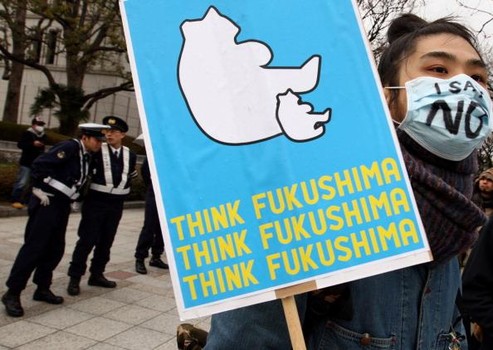A year and a half ago one of the largest known earthquakes ever struck off the North Japanese coast, triggering a tsunami devastating the Japanese coast, as well as a massive nuclear power disaster. Since then the Japanese people have spoken up clearly, with protests of tens of thousands of people calling for an end to nuclear power. At a press briefing in Tokyo on Friday, National Policy Minister Motohisa Furukawa announced “We will introduce policies to bring nuclear power generation down to zero within the 2030s… so that we can build a society that does not rely on nuclear power as early as possible.”
This would mirror moves in other countries, such as Germany, Italy, and Switzerland, who have announced plans to eliminate nuclear power generation.
What was announced is a “policy goal” that is not binding on future Japanese governments. While some of the protesters are pleased with the announcement, others are skeptical.
The new policy goal, the “Revolutionary Energy and Environment Strategy,” is to shut down reactors over 40 years old, not build any new reactors, and only allow reactors to restart if they pass standards set by a new regulatory agency. These moves would force a phasing out of reactors as they age, preventing old reactors from being replaced with new reactors. But some fear the policy gives a lifeline allowing reactors to remain operational for decades into the future.
Before the Fukushima Dai-ichi accident in March 2011, Japan was dependent on nuclear power for 30% of its electricity and planned to raise that dependency to over 50% by 2030. To reverse that trend and instead eliminate the use of nuclear power will be a tremendous undertaking. Business leaders have argued shutting down nuclear power plants will doom the country to a dismal economic future.
Because the majority of Japans nuclear reactors were shut down last year, the country is already experiencing a no-nuclear-power life. The electrical utilities are importing oil and natural gas to burn in fossil fuel burning power plants. These imports are coming at a high cost, and are threatening to send three of Japans electrical utilities into bankruptcy. On top of that the country has had to conserve power, even in the sweltering summer heat.
This means the country is already under stress due to electricity shortages, and the tactic to buy fossil fuels, at high cost, to make up for the lack of nuclear power.
From an environmentalists point of view the situation simply demonstrates the fallacy of depending on such an utterly dangerous tool for a crucial resource like electricity. Nuclear power is often sold as a global warming panacea because it has zero carbon footprint, but it carries with it the risk of nuclear contamination on a large scale, nuclear proliferation and other extreme hazards. Japan has had to abandon a large section of its countryside because of nuclear contamination, just as Russia had to abandon a large section of land around Chernobyl.
In August research was unveiled showing the nuclear contamination in the Fukushima area is causing genetic mutilations to animal species living in the area![]() .
.
- Is there enough Grid Capacity for Hydrogen Fuel Cell or Battery Electric cars? - April 23, 2023
- Is Tesla finagling to grab federal NEVI dollars for Supercharger network? - November 15, 2022
- Tesla announces the North American Charging Standard charging connector - November 11, 2022
- Lightning Motorcycles adopts Silicon battery, 5 minute charge time gives 135 miles range - November 9, 2022
- Tesla Autopilot under US Dept of Transportation scrutiny - June 13, 2022
- Spectacular CNG bus fire misrepresented as EV bus fire - April 21, 2022
- Moldova, Ukraine, Georgia, Russia, and the European Energy Crisis - December 21, 2021
- Li-Bridge leading the USA across lithium battery chasm - October 29, 2021
- USA increasing domestic lithium battery research and manufacturing - October 28, 2021
- Electrify America building USA/Canada-wide EV charging network - October 27, 2021
















